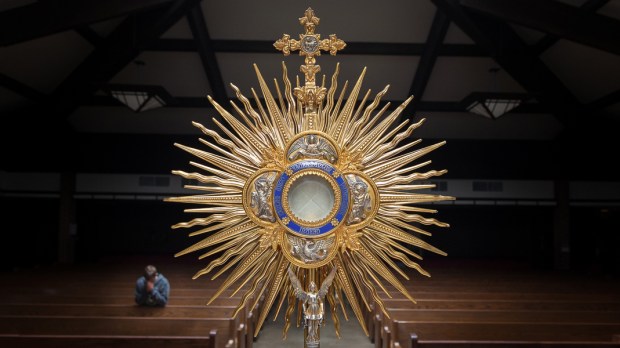We have prayed both for and against ourselves in the early petitions. We have prayed for the Father’s kingdom against our own, and we have prayed for the Father’s will. It’s his kingdom, his will, and we have prayed that it will come and be done that we will know him as our Father. We have prayed against our own will, our own kingdom. It is a prayer God, unmistakably, is happy to grant.
We must do this because the human inclination is to reject God and Christ, his Word. We’d rather go our own merry way, even if it ends in oblivion. These are petitions asking God to put our sins to death that he might thereby “create in us clean hearts.” (Ps. 51)
Clean hearts, that’s God’s work. “Prone to wander, Lord, I feel it,” says an old Baptist hymn by Robert Robinson (d. 1790), “prone to leave the God I love.”
It is God who must make us obedient, like St. Augustine said, so that we may greet his kingdom and happily seek his will. To do this he gives us his Word, the sacraments of the Church, our companions in faith. Through these tools the Holy Spirit works upon us to soften our hearts and train our minds. And every petition so far is as much pro nobis as it is contra nos.
We now come to the petitions from the resurrection side of Baptism, praying “Give us our daily bread.” Well, as bread goes, the psalm says we’re already covered. “The eyes of all look hopefully to you; you give them their food in due season.” (Ps. 145:15)
If the Father has already provided for us, what are we asking? We are praying that we will see it as God’s bread and not our own, and joyfully give thanks for it.
Once again, though, we bump into fallen Adam, fallen Eve. They turn up their noses at God’s bread. “Why do I have to pray for what I earn from my own work? It’s my bread. Everybody knows if I didn’t work for it, I wouldn’t get to eat it.”
Ah, stop. Remember, we are a new people, washed in the waters of God’s love.
We begin to realize that life is more than our own triumphs, more than our own bellies.
Recognizing, appreciating the gifts of God that suffuse daily life, we begin to see abundance in the small and defining things we encounter daily. Leading us to sink our teeth deeper into the joys of life is one way God tenderizes hearts.
In this world, we need tenderizing. Paul J. Griffiths, chair of Catholic theology at Duke Divinity, uses the word “devastation” to describe our fall into sin. A cosmic devastation wrought by fallen Adam, fallen angels and, for the most part, a world become “a charnel house, saturated in blood violently shed; an ensemble of … creatures decaying toward extinction; a theatre of vice and cruelty.”
Yet God gives visions. We are not mere victims of dumb capacious random futility. We catch still the flickering traces of creation’s dramatic beauty and occasional kindnesses, creation’s goal as our Father intended originally. These intimations, these glimmers, are providential visitations with hope.
Raised in Baptism to the life of Christ, we see around us with new eyes the ennobling gifts that bless human living. “Bread” in this petition of course means more than bread. To pray this is to give thanks for all needful things, including the gift of human ingenuity ― with all of its promise and threat ― in the co-creative task God has given to us.
Yes, I said that, co-creator with God. In Genesis (2:18-20), God gives to the man the task of naming the animals. The text implies God did not know their names until spoken by the man. I am deeply fascinated by this. I carry on imaginary conversations between the two.
God: Okay. What’s this?
Man: A platypus.
God: Say what?
Man: You said I could name it.
God: Alright, a platypus. But remember, you have to take care of it.
We name the things of creation becoming co-creators with the Father, and take responsibility for the gifts the Father as given for our conscientious, temperate use. Like the writer of Psalm 90, describing a devastated world, we beg God, “Prosper the work of our hands.”
We seek in creation everything else included in “bread”: family, friends, good government, faithful leaders, peace, health, decency, honor, and companionship in faith.
Further, we have also raised a plea for those who lack today’s bread. To ask for our bread evokes our obligations to our neighbors, “in solidarity with their needs and sufferings.”
We ask also for the bread of life that is God’s Word. This petition relentlessly links us to the Eucharist, the coming feast day of the kingdom consummated. As we pray for and know the joy of the bonds of kinship in our family suppers, so here we pray for a kinship that transcends time and eternity.
Previously: Thy Will be Done
Next: Forgive Us Our Trespasses

